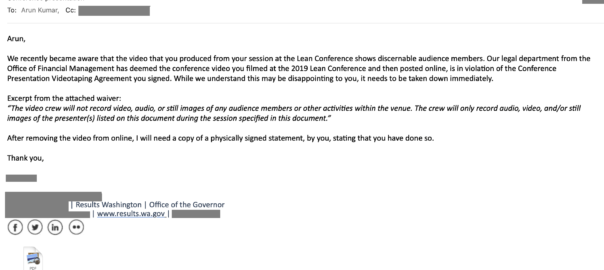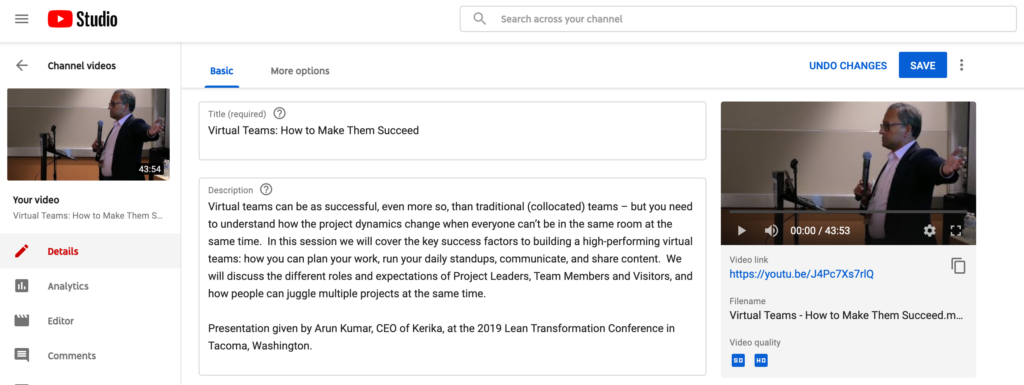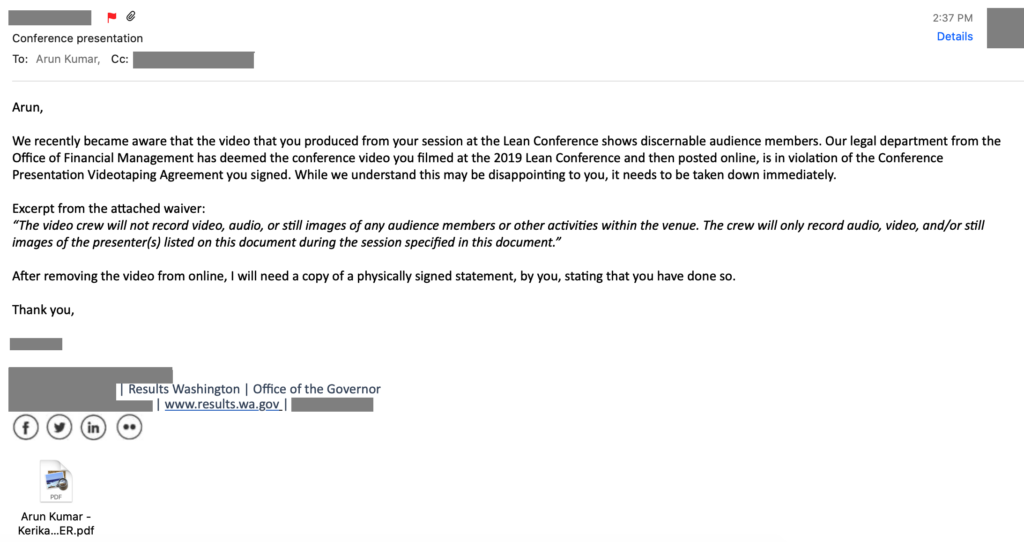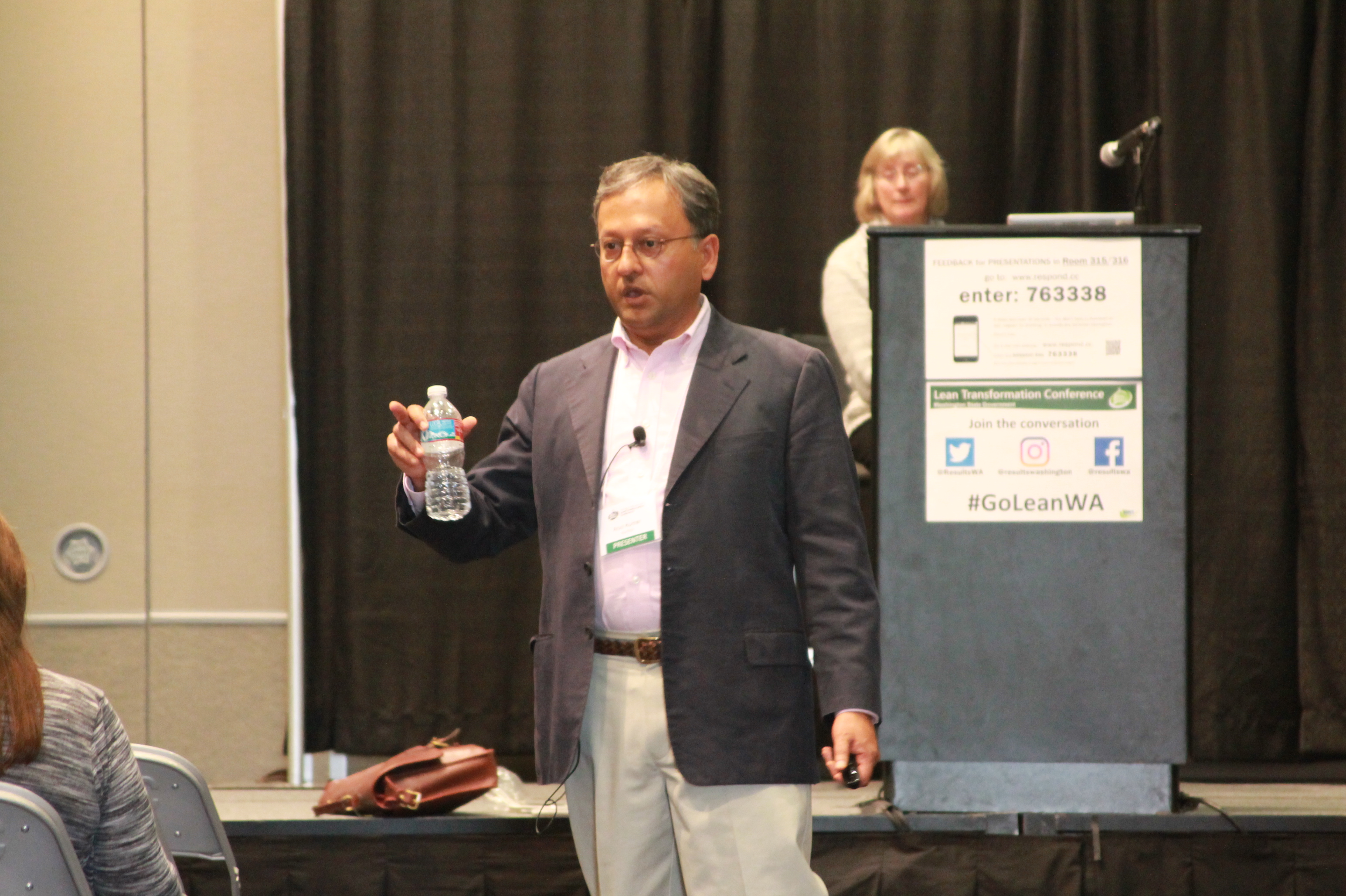A long (45 minutes) video of the presentation that Arun Kumar, CEO of Kerika, made at the Lean Transformation Conference last October, anticipating the need for accommodating remote and virtual teams.
A long (45 minutes) video of the presentation that Arun Kumar, CEO of Kerika, made at the Lean Transformation Conference last October, anticipating the need for accommodating remote and virtual teams.

Kerika has been a sponsor of the Lean Transformation Conference every year, since the very first conference. In addition to contributing sponsor fees, our founder and CEO, Arun Kumar, has given a presentation each year, on different topics related to the conference.
At the last conference (in October 2019), Arun gave a talk on Virtual Teams: what’s different about a virtual team vs. a traditional collocated team, and how a virtual team can be very successful if it adopts the right processes and tools. A total of 117 people attended, and 55% of them rated the presentation as “Very Useful” or “Extremely Useful”.
Kerika also paid for a professional videographer to film the presentation so it could be made available online for others.
The topic of Virtual Teams is particularly important today because the Covid-19 virus has hit the state of Washington hardest (in the US), and everyone, including the government employees are scrambling to adjust to telework.
You might think that the video would be particularly helpful to the state right now, since it covered precisely those topics that the state (and much of the world) is grappling with today:

Imagine our surprise then to receive, out of the blue, this takedown notice:

So the video is gone. A small business tried to help the state of Washington, but won’t try again.
We have a complete (one-hour long) video of the tutorial presented by Arun Kumar, CEO of Kerika, at the recent Lean Transformation Conference on the subject of Kanban vs Scrum: what’s the difference, and which should you use?
(The slides for this talk, and more, can be found on Slideshare.)
Topics covered:
Forming a team 00:01:32
The Product Owner 00:02:01
The Scrum Master 00:02:55
The Scrum Team 00:03:55
Pulling Work 00:04:04
The Product Backlog 00:05:45
Scrum Stories 00:06:25
Writing a good Story 00:07:35
From Epics to Stories 00:10:25
From Stories to Tasks 00:11:13
Estimating with Story Points 00:13:04
Organizing a Sprint 00:15:00
How long is a Sprint? 00:19:15
Sprints in theory 00:20:32
Sprints in real-life 00:20:53
Daily Standups 00:23:25
Burndown Charts 00:24:13
Team Velocity 00:25:35
Best Practices for Getting Scrum Right 00:28:00
The Nuclear Option 00:30:57
Where does Scrum work best? 00:32:02
Scrum in Government 00:33:25
Where does Kanban work best? 00:35:43
Collaboration Networks 00:37:25
Paper doesn’t scale 00:38:30
Using Kerika for Personal Kanban 00:39:50
Using Kerika for Team Kanban 00:40:24
Using Kerika in the Public Sector 00:40:37
Using Kerika for Scrum Projects 00:40:54
Capturing stories as “virtual sticky notes” 00:41:20
Summary 00:42:57
Question: how do you deal with poor performers on the team? 00:49:15
Question: in Scrum, are units of measure like lines of code still applicable? 00:50:08
Question: how do you measure individual performance? 00:51:03
Question: how do you handle poor performers within a team? 00:52:25
Question: when do you use the Nuclear Option? 00:54:20
Question: how do you estimate stories? 00:55:54
Photo credits: Abdul-Rasul Kassamali, Jama Abdirahman.
Arun Kumar, CEO of Kerika, and Joy Paulus, Senior Policy and Program Manager for the Washington State Office of the CIO, delivered a joint presentation at the Lean Transformation 2016 Conference.

The subject of the talk was “Collaboration Across Organizations: Big Results with Small Teams”. Here are the slides from the talk:
Arun Kumar, Kerika’s CEO, gave a presentation on Visual Workflows at the Lean Transformation 2015 Conference in Tacoma, Washington, which was very well received.
Here are the slides from that talk:
Once again Arun Kumar, Kerika’s founder and CEO, will be speaking at the annual Lean Transformation Conference organized by Results Washington.
This conference is all about Lean and Agile in the public sector: thousands of folks from state, county and local (city) government agencies will be attending, and as usual Kerika will also have a display booth on the 5th floor of the Tacoma Convention Center.
Arun’s topic this year is “Can You See It Now? Visualizing your Lean and Agile Workflows”.
We look forward to seeing our Washington users at the conference; please do stop by our booth or sign up for Arun’s talk!
Here’s an hour-long video of Michael DeAngelo‘s presentation on Lean Government & Holacracy in Washington State:
Highlights from his talk:
On the Office of the CIO
On Lean Government
On Holacracy
Quotes
“The reality is, a lot of the cloud providers can provide better security solutions than we can afford internally.”
“For us, cloud is actually one of the strategies for increasing security for the state.”
“The interesting question is, how do you do oversight and QA — really project management QA, not just traditional software QA — in an agile context?”
“One of the metrics for Agile QA: is the business engaged?” (Not just steering committees like before, but do we really have engaged product owners.)
“The contracts and procurement shop in state government practice what they call XP — Extreme Procurement”
“Washington is the only state to practice Agile Procurement and Agile Contracting”
“Downside of holacracy: everyone loves to tell me that I am not the boss of them”
“No government has ever practiced holacracy before.”
“Holacracy has never been practiced with a represented workforce before. (One with employee unions.)”
“I have been practicing holocracy for a few months, and I feel like I have a different set of lenses through which I look at work.”
“When I talk to people who are not practicing holacracy, I see evil spirits around them, like bureaucracy, office politics, inefficient meetings…”
“We develop these habits to compensate for the deficiencies of a hierarchical organization, instead of trying to change it, and this is after thousands of years of evolution.”
“The team has to want it: you need opt-in for holacracy to work.”
“Imagine trying to play soccer with a hierarchical organization, where the team is run by managers who are responsible for different sections of the field.”
“Because I am the manager, you need to always pass the ball to me. Ridiculous as that seems, that’s how hierarchical organizations work.”
“90% of my time is spent on crap that runs government work, and that’s because of the authority of my position.”
“As a manager I don’t have a passion for a lot of things, but other people might, so I want to give them the authority to take them on.”
“Healthy habits in a dysfunctional system become unhealthy habits in a functional system.”
“In holacracy, you quickly learn what makes for a valid objection.”
“The type of people who would not respond well to holacracy are managers that derive their self-worth on span of control.”
“There’s a category of employees who have no interest in being self-directed: they just want to be told what to do.”
As part of his talk on Lean & Agile Government, Michael DeAngelo also reviewed a recent Agile QA audit done for the Washington State Office of the CIO by Joseph Flahiff, CEO of Whitewater.
Here’s the report:
Michael DeAngelo, Deputy CIO for the State of Washington (and a long-time user of Kerika 🙂 gave a talk on Lean & Agile Government in Washington State, at the Beyond Agile meetup in Kirkland last week.
Here are his slides:
We will shortly be uploading another presentation, on Agile QA, as well an edited video of his entire talk.
At the Jan 12, 2015 meeting of the Washington State Lean Practitioners Community of Practice meeting, organized by Results Washington at the Department of Labor & Industries in Tumwater, Arun Kumar presented Kanban in a Can: Capture, Visualize and Optimize your Everyday Processes.
Here’s the presentation on Slideshare (although most of it was actually a demo!):
The meeting was attended by dozens of Lean experts representing a huge variety of state agencies in Washington!